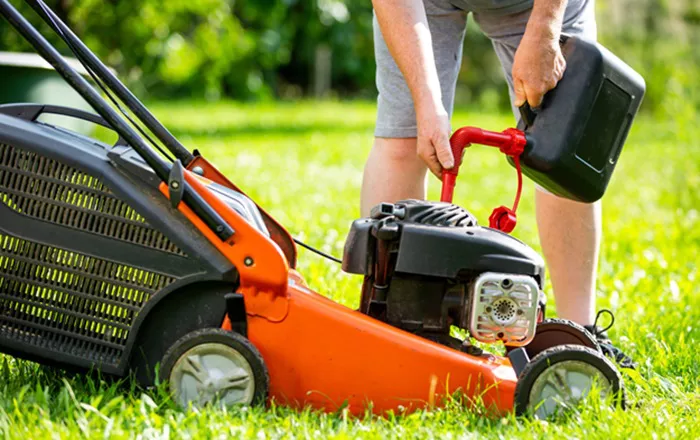Choosing the right gasoline for your lawn mower is crucial for ensuring its smooth operation, longevity, and overall performance. With various types of gasoline and additives available, it can be confusing to know what’s best for your mower. This comprehensive guide will walk you through everything you need to know about selecting the appropriate gas for your lawn mower, including the types of gasoline, ethanol content, additives, and storage tips.
1. Understanding Gasoline Types
Unleaded Gasoline
Unleaded Gasoline: The most common type of gasoline used in lawn mowers is regular unleaded gasoline. Unleaded gasoline is free from lead, which was historically used in fuels but is now banned due to its harmful effects on health and the environment. Using unleaded gasoline is essential for modern lawn mowers to avoid engine damage and maintain compliance with environmental regulations.
Octane Rating: The octane rating of gasoline measures its ability to resist engine knocking or pinging during combustion. For most lawn mowers, regular unleaded gasoline with an octane rating of 87 (R+M)/2 is adequate. This rating provides enough resistance to knocking for typical small engines found in lawn mowers.
Premium Gasoline
Premium Gasoline: Premium gasoline has a higher octane rating, usually around 91-93 (R+M)/2. While premium fuel may offer better performance in high-compression engines, it is generally not necessary for most lawn mowers. Using premium gasoline will not significantly improve engine performance or longevity for standard mowers, and it may only add unnecessary cost.
2. Ethanol Content in Gasoline
Understanding Ethanol
Ethanol: Ethanol is an alcohol derived from plant sources such as corn and is commonly blended with gasoline to reduce emissions and promote cleaner burning. However, ethanol can have mixed effects on small engines.
Ethanol Blends: Gasoline often contains ethanol in varying amounts, such as E10 (10% ethanol) or higher concentrations like E15 and E85. For lawn mowers, it is generally recommended to use gasoline with no more than 10% ethanol (E10). Higher ethanol concentrations can lead to fuel system issues and engine damage.
Effects of Ethanol on Small Engines
Moisture Attraction: Ethanol attracts moisture from the air, which can lead to fuel separation and corrosion in the engine’s fuel system. This moisture can cause starting problems, rough running, and long-term damage.
Fuel Degradation: Ethanol-blended fuels can degrade more quickly than pure gasoline, leading to issues such as clogged fuel lines and poor engine performance. To mitigate these problems, use fresh gasoline and consider using fuel stabilizers.
3. Fuel Additives and Stabilizers
Fuel Stabilizers
Purpose: Fuel stabilizers are additives designed to prolong the life of gasoline and prevent it from breaking down over time. They help maintain the fuel’s effectiveness and prevent issues such as gumming and varnishing.
Usage: Adding a fuel stabilizer to your gasoline is especially important if you store your lawn mower for extended periods, such as during the off-season. Follow the manufacturer’s instructions for the correct amount of stabilizer to use.
Fuel System Cleaners
Purpose: Fuel system cleaners help remove deposits and keep the fuel system clean. They can improve engine performance and fuel efficiency by preventing clogs and ensuring proper fuel flow.
Usage: Regular use of fuel system cleaners can help maintain engine health, especially if you use ethanol-blended fuels. These cleaners are usually added to the fuel tank according to the manufacturer’s guidelines.
See also: Can You Jump A Car With A Drill Battery?
4. Mixing Fuel for Two-Cycle Engines
Two-Cycle Engines
Pre-Mixed Fuel: Some lawn mowers, especially older models and certain types of equipment, use two-cycle engines that require a mixture of gasoline and oil. This mixture lubricates the engine and ensures proper operation.
Mixing Ratio: The fuel-to-oil ratio for two-cycle engines varies by manufacturer but is often 50:1 (50 parts gasoline to 1 part oil). Always refer to your lawn mower’s user manual for the specific ratio recommended for your engine.
Pre-Mixed Fuel Options: Pre-mixed fuel is available for convenience and ensures the correct oil-to-gas ratio. It is especially useful if you are not familiar with mixing fuel yourself.
5. Fuel Storage and Handling
Fresh Gasoline
Importance: Always use fresh gasoline to ensure optimal performance. Gasoline can degrade over time, leading to starting issues and poor engine operation. It’s best to use fuel within 30 days of purchase.
Storage Tips: Store gasoline in a cool, dry place, away from direct sunlight and heat sources. Use a proper fuel container with a secure seal to prevent contamination and evaporation.
Proper Containers
Fuel Containers: Use containers specifically designed for gasoline storage. These containers are built to safely hold fuel and often come with features such as spill-proof caps and handles for easy pouring.
Handling: Handle gasoline with care, avoiding spills and ensuring the container is tightly sealed. If you spill gasoline, clean it up promptly and properly dispose of any contaminated materials.
See also: Do 4 Strokes Need Mixed Gas: What You Need To Know
6. Manufacturer Recommendations
Consulting the Manual
User Manual: Always refer to your lawn mower’s user manual for specific recommendations on fuel type and octane rating. The manufacturer’s guidelines provide the best information on what fuel is suitable for your engine.
Warranty Considerations: Using the recommended type of gasoline is important for maintaining your warranty. Deviating from the recommended fuel could potentially void the warranty and lead to engine issues.
Conclusion
Selecting the right gasoline for your lawn mower is crucial for ensuring its smooth operation and longevity. Use fresh, unleaded gasoline with an octane rating of 87 for most lawn mowers, and avoid ethanol blends higher than 10% to prevent fuel system problems. Consider adding fuel stabilizers and using pre-mixed fuel if you have a two-cycle engine. Proper storage and handling of gasoline, along with adhering to manufacturer recommendations, will help keep your lawn mower running efficiently and reliably. By following these guidelines, you can ensure your lawn mower performs at its best and remains a reliable tool for maintaining your lawn.
Related Topics:

